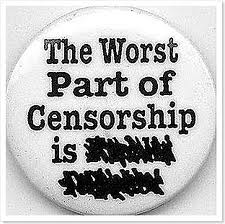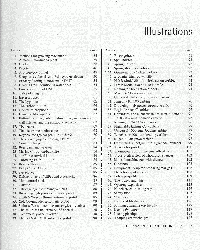Censorship
Contents
Types of censorship
Censorship takes place in the following forms:
- Text: This refers to the censorship of material found in the written media such as newspapers, magazines, published articles and books.
- Visual Media: This refers to content that involves motion art or photographs. Examples are comics, television shows, and movies.
Censorship can take place in two different ways: replacement or removal of content.
Replacement
This type of censorship occurs when a part of a work is edited to replace the controversial expression. For instance, profanity on television is replaced with an alternative audio clip or silence. On other occasions foul language is replaced by a beeping noise and scenes involving nudity are often blurred.
Removal
This type of censorship occurs when the work in question is completely removed from public access. In the context of text censorship, this may involve banning a book in a country. In the visual media, a scene of a movie may be censored in the televised version.
Why censor?
"The primary motivation for censorship is often disapproval of the content or worry about its effects on "public morality". [2] There are several reasons to introduce censorship.
Reasons for censorship
Politics
Political censorship can be used for a variety of purposes. Often governments use censorship for the interest of the security of their nations. Sometimes it is used to safeguard military intelligence and other security aspects of a country. On the contrary, some times censorship is misused to conceal useful information and to turn around a political situation. Political leaders can exercise their power to restrict information that speaks against the government. In many Eastern countries, politicians have misused their power to enforce media censorship and conceal the problems created by the government.Religion
It is our right to speak freely, but sometimes it is important to draw a boundary while dealing with sensitive issues like religion. In some cases, where release of inaccurate information has the potential to cause disruptive results, then it may be ideal to withhold such information. If censorship aids to protect and respect religious beliefs, then it may be the right option to choose. However, religion has often been inaccurately used as a mere tool to speak against censorship. Such an instance should never be allowed because it severely hampers the growth of a community.
Social
Morally questionable content is often censored to protect the interests of families and children. Such content may include obscene language, material that shows violence, or sexual content. As a tangent, sometimes people use the argument that the media is responsible for introducing new cultures and ideas and is harming their local customs and traditions. Some people agree with this statement, while others favor the idea of transfer of cultural values through the media. It is a debate that introduces a lot of disagreement and conflict of opinions.
Other
Other motivations for censorship, however, may include the moral disapproval of what individuals may do with the information gained from accessing an expression. For example, information on bomb making is, in itself, non threatening, however, what individuals may choose to do with this information can be very threatening.
- Inherently Harmful Access
"This view holds that accessing some content is simply inherently bad" (Censorship 2008 pp. 580).
See also: Kay Mathiesen.
- Instrumentally Harmful Access
Content is censored for the concern that harm to another may be a consequence to unrestricted access to certain information.
See also: Kay Mathiesen.
- Censorship and Pornography
See also: Censorship and Pornography.
- Maps
Many maps, especially online, are censored for military purposes. Google Maps, for example, gray out, or show out-dated images of certain restricted areas of the world.
Should we censor?
There are several implications associated with censorship. It is interesting to note that censorship can be used to do two completely opposite things. It can either silence people or it can protect them.
As a form of protection, it is used to classify all types of content according to age restrictions. Such an instance allows us to choose the appropriate kind of audience and works to benefit the society. On a similar note, censorship of confidential information such as a business' private information can allow stakeholders to reserve information that should not be seen by the public. In that case, it protects personal privacy and is a clear/good advantage.
However, censorship becomes a disadvantage if it is misused to hide relevant information. In the past, governments have been accused of censoring information in the name of maintaining civil order and protecting citizens. The government of Pakistan censors text messages that express anti-government sentiment. Such an instance violates the use of censorship. In Cuba, the government censors the use of the Internet. People's browsing histories are monitored and only pro-government content is allowed to be seen. Everyone has a right to know. Misuse of censorship takes away the freedom of speech and can impede the expression of someone's ideas.
Ethical Concerns
Censorship provides an interesting ethical dilemma due to the fact that oftentimes when it is employed, it is used to protect individuals. This raises the question as to whether or not it is alright to censor if it saves lives. In the case of WikiLeaks, it was maintained by the founders of the site that destroying the government's act of censorship was an acceptable action even if it resulted in the loss of a few lives. The fine balance between loss of life and freedom of speech and expression is one that must be acknowledged and better defined as more and more people have ways to access information that was previously unaccessible by the public.
See Also
- Censorship and Pornography
- David Thorne
- Information Ethics
- Internet Censorship in Hong Kong
- Kind of Bloop
- Kay Mathiesen
- Phototruth
- Stop Online Piracy Act
- Protect IP Act
References
- ↑ Wikipedia - Censorship
- ↑ "Censorship and Access to Expression" The Handbook of Information and Computer Ethics, 2008. https://ctools.umich.edu/access/content/attachment/aaaaaee7-1694-481e-95b6-090bdec54ec2/Assignments/227d63b0-669c-4a3e-9399-23a8f97ad737/MediaWiki%20Writing%20Assignment.pdf


